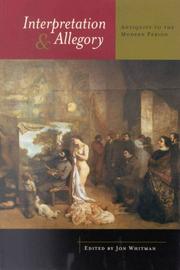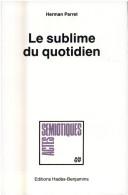| Listing 1 - 10 of 151 | << page >> |
Sort by
|
Book
ISBN: 0801491061 9780801491061 Year: 1970 Publisher: Ithaca, N.Y.: Cornell university press,
Abstract | Keywords | Export | Availability | Bookmark
 Loading...
Loading...Choose an application
- Reference Manager
- EndNote
- RefWorks (Direct export to RefWorks)
Allegory --- Allegories

ISBN: 9789004453593 9780391041868 Year: 2003 Publisher: Leiden;Boston BRILL
Abstract | Keywords | Export | Availability | Bookmark
 Loading...
Loading...Choose an application
- Reference Manager
- EndNote
- RefWorks (Direct export to RefWorks)
Western literary, philosophical, and religious traditions from Plato and Paul to Augustine and Avicenna have utilized, exploited, or been subjected to allegorical interpretation. Naturally developing a composite picture of interpretive allegory from such a large landscape faces numerous difficulties. As the editor puts it, "to imagine a 'definitive' account of the theory and practice of allegorical interpretation in the West would require something of an allegorical vision in its own right." With that caveat in mind, however, the international team of contributors-from a variety of disciplines-offers a "historical and conceptual framework" for understanding interpretive allegory in the West, from antiquity through the early and late medieval and renaissance periods, and from the eighteenth through the twentieth centuries. This publication has also been published in hardback, please click here for details.
Allegory --- Hermeneutics --- History
Book
ISBN: 1350113271 1350113263 9781350113268 9781350113275 9781350116337 1350116335 1780762984 9781780762982 9781780762982 Year: 2019 Publisher: London : Bloomsbury Academic,
Abstract | Keywords | Export | Availability | Bookmark
 Loading...
Loading...Choose an application
- Reference Manager
- EndNote
- RefWorks (Direct export to RefWorks)
Iranian filmmakers have long been recognised for creating a vibrant, aesthetically rich cinema whilst working under strict state censorship regulations. As Michelle Langford reveals, many have found indirect, allegorical ways of expressing forbidden topics and issues in their films. But for many, allegory is much more than a foil against haphazardly applied censorship rules. Drawing on a long history of allegorical expression in Persian poetry and the arts, allegory has become an integral part of the poetics of Iranian cinema. Allegory in Iranian Cinema explores the allegorical aesthetics of Iranian cinema, explaining how it has emerged from deep cultural traditions and how it functions as a strategy for both supporting and resisting dominant ideology. As well as tracing the roots of allegory in Iranian cinema before and after the 1979 revolution, Langford also theorizes this cinematic mode. She draws on a range of cinematic, philosophical and cultural concepts - developed by thinkers such as Walter Benjamin, Gilles Deleuze, Pier Paolo Pasolini, Christian Metz and Vivian Sobchack - to provide a theoretical framework for detailed analyses of films by renowned directors of the pre-and post-revolutionary eras including Masoud Kimiai, Dariush Mehrjui, Ebrahim Golestan, Kamran Shirdel, Majid Majidi, Jafar Panahi, Marziyeh Meshkini, Mohsen Makhmalbaf, Rakhshan Bani-Etemad and Asghar Farhadi. Allegory in Iranian Cinema explains how a centuries-old means of expression, interpretation, encoding and decoding becomes, in the hands of Iran's most skilled cineastes, a powerful tool with which to critique and challenge social and cultural norms. -- Publisher.
Multi
ISBN: 9780823292653 9780823242849 Year: 2022 Publisher: New York, N.Y. Fordham University Press
Abstract | Keywords | Export | Availability | Bookmark
 Loading...
Loading...Choose an application
- Reference Manager
- EndNote
- RefWorks (Direct export to RefWorks)
Literature --- Allegorie. --- Allegory. --- Literatur.
Book
ISBN: 9783846757574 9783770557578 3846757578 Year: 2015 Publisher: Paderborn : Wilhelm Fink Verlag,
Abstract | Keywords | Export | Availability | Bookmark
 Loading...
Loading...Choose an application
- Reference Manager
- EndNote
- RefWorks (Direct export to RefWorks)
Die Schwelle ist ein besonderer Raum. Sie gehört weder zum Innen- noch zum Außenraum. Sie umgrenzt einen Bereich, der nicht zuzuordnen ist und begrifflich undefiniert bleibt. Auf die Besonderheit dieses Raumes deutet die Schwelle des Erkennens, wie sie Zeitgenossen eines Epochenübergangs erfahren. Sie fühlen sich eingeschlossen in einer terra incognita, die aber selbst die Grenzen der bekannten Welt aufsprengt und unauslotbar erscheint. Baudelaire und Proust reflektieren diese paradoxe Erfahrung der frühen und späten Phase der Moderne im Verfahren der Allegorie. Diese erzeugt ästhetische Schwellen im Text. Sie öffnet jenseits der buchstäblich lesbaren Welt diffuse Zonen des Surrealen und Atmosphärischen, Areale einer unerklärlichen Schönheit. In kritischer Auseinandersetzung mit prominenten literaturtheoretischen Ansätzen erkundet der Band die funktionale Spannbreite der Allegorie als textuelles Verfahren.
Book
ISBN: 3849814572 9783849814571 3895284483 Year: 2019 Publisher: Bielefeld : Aisthesis Verlag,
Abstract | Keywords | Export | Availability | Bookmark
 Loading...
Loading...Choose an application
- Reference Manager
- EndNote
- RefWorks (Direct export to RefWorks)
Long description: Das Höhlengleichnis des großen Philosophen der Griechen Platon ist allgemein bekannt, es wurde zu dem Vorbild für sechs weitere Höhlengleichnisse aus Antike und byzantinischem Mittelalter. Während das von Aristoteles noch relativ bekannt ist, gilt das für die fünf weiteren Höhlengleichnisse nicht mehr. Der vorliegende Band enthält die Urtexte der sieben Höhlengleichnisse mit deutscher Übersetzung, jedes einzelne Gleichnis wird genau interpretiert. Thema des letzten Kapitels ist die Weiterwirkung bis in das 20. Jahrhundert hinein; es werden zum Beispiel die Anspielungen bei Friedrich Dürrenmatt, Clive Staples Lewis oder Luigi Pirandello zitiert und erläutert. Den Abschluß bilden die kurzen Worte des Begründers der neuzeitlichen Philosophie, René Descartes, zum Wesen der Höhle. So erschließt der Band das literarische Genus der Höhlengleichnisse über einen Zeitraum von rund 2 500 Jahren europäischer Geistesgeschichte. Biographical note: Wilhelm Blum, Dr. phil., Jahrgang 1943, hat Klassische Philologie, Geschichte und Philosophie studiert. Anschließend war er tätig in der Erwachsenenbildung, an der Universität und an Gymnasien. Derzeit ist er Lehrer am Maximiliansgymnasium in München. Er ist Autor zahlreicher Bücher und Aufsätze zu verschiedenen Themen der Geistesgeschichte.

ISBN: 1280879718 9786613721020 9027278806 9789027278807 9027222665 9789027222664 9781280879715 6613721026 Year: 1988 Publisher: Paris : Amsterdam ; Philadelphia : Hades ; Benjamins,
Abstract | Keywords | Export | Availability | Bookmark
 Loading...
Loading...Choose an application
- Reference Manager
- EndNote
- RefWorks (Direct export to RefWorks)
Une phénoménologie de la quotidienneté révèle des moments de fracture esthétique. L'interruption du sublime engendre des instants d'allégresse et de bonheur, et confirme notre sentiment d'existence. L'aisthèsis quotidienne transcende de loin l'eidétique du regard et de la lumière; elle n'est comblée que par la synesthésie du goût et du toucher instaurant la fusion et la jonction. Le sublime du quotidien, tributaire de l'esthétique de Kant et de la sémiotique de Greimas est conçu comme l'éloge de la passion du beau. L'auteur réfléchit sur la possibilité d'une biographie située entièrement dans
Allegory. --- Personification in literature --- Symbolism in literature
Book
ISBN: 9004310436 9789004310438 9789004310421 9004310428 Year: 2016 Publisher: Leiden, Netherlands ; Boston, [Massachusetts] : Brill,
Abstract | Keywords | Export | Availability | Bookmark
 Loading...
Loading...Choose an application
- Reference Manager
- EndNote
- RefWorks (Direct export to RefWorks)
Personification, or prosopopeia , the rhetorical figure by which something not human is given a human identity or ‘face’, is readily discernible in early modern texts and images, but the figure’s cognitive form and function, its rhetorical and pictorial effects, have rarely elicited sustained scholarly attention. The aim of this volume is to formulate an alternative account of personification, to demonstrate the ingenuity with which this multifaceted device was utilized by late medieval and early modern authors and artists in Italy, France, England, Scotland, and the Low Countries. Personification is susceptible to an approach that balances semiotic analysis, focusing on meaning effects, and phenomenological analysis, focusing on presence effects produced through bodily performance. This dual approach foregrounds the full scope of prosopopoeic discourse—not just the what, but also the how, not only the signified, but also the signifier.
Personification in literature. --- Pathetic fallacy --- Allegory
Book
ISBN: 9789004407596 9789004408272 Year: 2019 Publisher: Leyde : Brill
Abstract | Keywords | Export | Availability | Bookmark
 Loading...
Loading...Choose an application
- Reference Manager
- EndNote
- RefWorks (Direct export to RefWorks)
"Neoplatonic allegorical interpretation expounds how literary texts present philosophical ideas in an enigmatic and coded form, offering an alternative path to the divine truths. The Neoplatonist Porphyry's On the Cave of the Nymphs is one of the most significant allegorical interpretations handed down to us from Antiquity. This monograph, exclusively dedicated to the analysis of On the Cave of Nymphs, demonstrates that Porphyry interprets Homer's verse from Odyssey 13.102-112 to convey his philosophical thoughts, particularly on the material world, relationship between soul and body and the salvation of the soul through the doctrines of Plato and Plotinus. The Homeric cave of the nymphs with two gates is a station where the souls descend into genesis and ascend to the intelligible realm. Porphyry associates Odysseus' long wanderings with the journey of the soul and its salvation from the irrational to rational through escape from all toils of the material world"--
Neoplatonism. --- Allegory. --- Philosophy in literature --- Porphyry, --- Homer.
Book
ISBN: 9780521862295 9780521680820 0521680824 0521862299 1139002856 1139801392 9781139002851 Year: 2010 Volume: *137 Publisher: Cambridge, UK: Cambridge university press,
Abstract | Keywords | Export | Availability | Bookmark
 Loading...
Loading...Choose an application
- Reference Manager
- EndNote
- RefWorks (Direct export to RefWorks)
Allegory is a vast subject, and its knotty history is daunting to students and even advanced scholars venturing outside their own historical specializations. This Companion will present, lucidly, systematically, and expertly, the various threads that comprise the allegorical tradition over its entire chronological range. Beginning with Greek antiquity, the volume shows how the earliest systems of allegory developed in poetry dealing with philosophy, mystical religion, and hermeneutics. Once the earliest histories and themes of the allegorical tradition have been presented, the volume turns to literary, intellectual, and cultural manifestations of allegory through the Middle Ages and Renaissance. The essays in the last section address literary and theoretical approaches to allegory in the modern era, from reactions to allegory in the eighteenth and nineteenth centuries to reevaluations of its power in the thought of the twentieth century and beyond.
Literary semiotics --- Literary rhetorics --- Allegory. --- Allégorie --- Allegory --- Allégorie --- Languages & Literatures --- Literature - General --- Littérature --- Littérature
| Listing 1 - 10 of 151 | << page >> |
Sort by
|

 Search
Search Feedback
Feedback About UniCat
About UniCat  Help
Help News
News